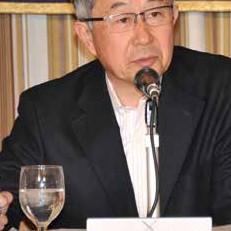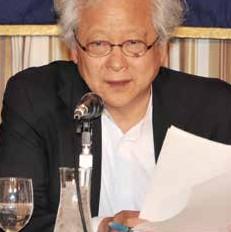Issue:
A COALITION OF HUMAN RIGHTS GROUPS BELIEVES EXECUTIONS WILL RISE WITH THE LDP BACK IN POWER
If he is sufficiently sound of mind, Shoko Asahara has cause to be very concerned. The figurehead of his own homemade religion, Aum Shinrikyo, Asahara has been convicted of 13 charges, including murder and masterminding the release of sarin gas on the Tokyo subway system back in 1995 as part of a plot to overthrow the government. He is now incarcerated in a solitary confinement cell.
And because he’s not a very sympathetic figure to the Japanese public, that makes him a prime target for the next execution order to be signed by Justice Minister Sadakazu Tanigaki, according to Yoshihiro Yasuda, a lawyer who represented Asahara and a member of Forum 90, a group demanding the abolition of the death penalty in Japan.
“There has been a movement in the media calling for Asahara to be executed as soon as possible,” Yasuda told a press conference at the FCCJ on March 15. “I believe there is a great risk that Mr. Tanigaki will respond to that by implementing the death penalty.
“Many people say that his political status will rise if he goes ahead and signs the execution order,” Yasuda added. “I feel very strongly that ordering the death penalty for political gain should never happen.”
Yasuda was appearing alongside Hideki Wakabayashi, secretary general of Amnesty International Japan, to announce a campaign appealing to the government to halt capital punishment. The campaign comes just weeks after the execution of three death row inmates for crimes that the gov Yasuda was appearing alongside Hideki Wakabayashi, secretary general of Amnesty International Japan, to announce a campaign appealing to the government to halt capital punishment. The campaign comes just weeks after the execution of three death row inmates for crimes that the government described as “extremely brutal.”
Kaoru Kobayashi, 44, was hanged after being convicted of kidnapping and killing an elementary schoolgirl in 2004. Masahiro Kanagawa, aged 29, had been found guilty of a series of random killings in 2008, while 62-year-old Keiko Kano was executed for the murder of a bar owner in Nagoya in March 2002.
Speaking at a press conference after the executions were carried out, the justice minister explained the reason why he had signed the approval orders for the first executions since the Liberal Democratic Party was voted back into power in December. “All these cases involved atrocious crimes that stole precious lives for selfish reasons,” Tanigaki said.
The LDP’s “bold approach” to the death penalty is at odds with global trends, said Yasuda, with the number of countries that retain the punishment shrinking to just 20. Of the member states of the Organization for Economic Cooperation and Development and the G-8, only Japan and the United States still have the death penalty on their statute books.
Wakabayashi pointed out that retaining the death penalty makes a mockery of Japan’s ratification of numerous international treaties on human and civil rights, while adding that the government’s frequently repeated claim that the death penalty “reflects the will of the people” is substantially flawed.
“The surveys that they use to determine support for the death penalty are filled with leading questions, so they do not genuinely reflect the will of the people,” he said. “The surveys might show that 86 percent of people say they support the death penalty, but it is clear that figure is very inflated.”
Wakabayashi believes the true figure for people who support the death penalty in Japan is less than 50 percent.
Yasuda expressed particular concern over a number of cases in which the death penalty has been handed down to a defendant in spite of evidence that a mis carriage of justice has taken place.
He cited the Hakamada Case, which involved the June 1966 murder of a senior official of a miso production company in Shizuoka Prefecture and three of his relatives. After 23 days of nearonstant interrogation, Iwao Hakamada “confessed.” Despite withdrawing his confession in court and telling the judge he was given no food or water, beaten and kicked and only allowed to briefly speak with his three lawyers on three brief occasions, he was sentenced to death.
Now 77, Hakamada has been incarcerated for 46 years and is suffering a condition that experts describe as “prison psychosis.”
Despite repeated setbacks in his legal team’s quest for a retrial, a motion to reexamine the case is under way. The appeal has been bolstered by prosecutors finally admitting that audio tapes of the interrogation do exist, while there are also suggestions that police fabricated evidence involving bloodstains on clothing Hakamada was allegedly wearing during the attacks.
“Despite repeated calls for a new trial and DNA tests that show Hakamada is probably not guilty, we are still waiting for a new trial to be set,” Yasuda said.
But the lawyer believes it is Asahara who is at greatest risk of becoming Mr. Tanigaki’s next victim. And while he accepts that Asahara was responsible for the atrocious acts carried out in the name of Aum Shinrikyo, he also believes that he is in no fit state to stand trial, let alone be executed.
“When I last met him, many years ago now, I could tell that he was not in a fit mental state, and a number of psychiatrists have agreed with that assessment,” Yasuda said. “Despite this, the authorities insisted that he was fit to stand trial.
“Actually, since June 2006, no one has been able to meet him, either his family or legal team, so we do not even know if he is alive or dead.”
Julian Ryall is Japan correspondent for The Daily Telegraph.



